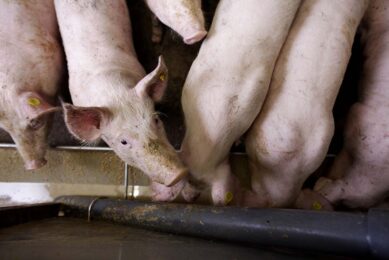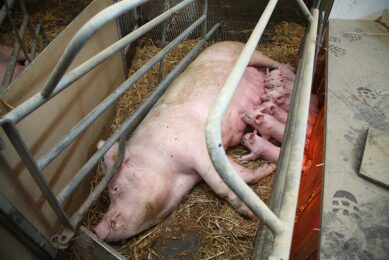“We have kept our focus on performance minerals”

Zinpro started its business 45 years ago, and throughout all those years has kept its focus on trace minerals. Current COO and president William Scrimgeour explains to Pig Progress what the company’s future holds.
Zinpro Corporation founder, Dean Anderson, had a mission 45 years ago. His experiences in selling zinc bacitracin prompted his interest in zinc for animal nutrition. He believed that some zinc compounds are responsible for improved responses in animals and wanted to study this in more detail. It was the start of a movement he created in the animal production sector by sharing his knowledge on trace minerals and how they can improve wellbeing and performance in livestock. Today, the family-owned, privately-held company has not only grown in size, but it has also accumulated a wealth of knowledge on trace minerals and how they can improve animal performance and health. This is only possible because of the dedicated focus and commitment by the company and its employees to invest in research and innovation.
Profile
Name: William Scrimgeour
Company: Zinpro Corporation. Manufacturer of Performance Minerals.
Job title: President and COO
Pig Progress: What makes agriculture so interesting for you personally?
William Scrimgeour: “I grew up in a small town in Minnesota, USA. My father was a pharmacist and ran a local drug store, but I was surrounded by a big farming community. Starting at a young age and through high school, I was very much involved in agriculture, working on local farms. I learned to appreciate the hard work that came with farming, and that inspired me to study agriculture at the University of Minnesota. After graduation, I focused my work entirely on the animal production industry, including 18 years managing international operations. In 1995, I moved from ADM to Zinpro Corporation when our current CEO, Mike Anderson, asked me to set up the company’s international business. Zinpro was a small company back then, and the CEO saw opportunities for Zinpro to become a global company.”
Why is Zinpro only focused on trace minerals?
“The founder of Zinpro Corporation was very passionate about the animal’s wellbeing, health and performance. He believed that an animal nutrition company that concentrates its efforts on trace mineral nutrition could excel in making animals healthier and the world more sustainable. He focused on this vision and developed a company around it. He started Zinpro with this vision, and we are still focused on that vision today. The innovation and science that we have uncovered over the years has provided plenty of opportunity to grow, and there is so much more knowledge yet to learn from trace minerals. This is why we keep focused on performance mineral nutrition. Only with adequate research are you able to translate basic science into practical solutions that make a real difference for the animal production industry. This year, we will mark a milestone, by recording our 200th peer-reviewed publication on the benefits of using performance trace minerals. We are passionate about understanding and developing performance trace minerals and the benefit of improving the lives of animals and the people who care for them.”
Are trace minerals so complex then?
“Yes, they are actually. We have studied the essential trace minerals for 45 years now. We have gained many insights, but we keep on learning. This is because trace minerals affect many functions and systems in the animal’s body. Take zinc for example, a trace mineral that plays a role in more than 300 enzyme systems (immune system, cell production, wound healing among others). Considering we have multiple animal species to study, including the many production stages that require different approaches; you can imagine that we are just tipping the iceberg of what we know about trace minerals. And frankly, because we do so much research, we continuously uncover new areas of innovation to study. Uncovering new innovations is exciting, of course, because you never know how one research study could lead to new products in the future.”
You have a strong focus on prevention of lameness. Why?
“Lameness is indeed a large problem for which we try to find solutions. Trace minerals are part of the solution, but not the entire solution. Farmers often face an accumulation of many factors that contribute to the problem. This is why we work with partners, academia and experts that bring different types of expertise needed to help tackle a complex problem such as lameness. This disease affects millions of animals around the world and is therefore the source of a huge financial loss to many producers. With our partners, we develop a total solution, which goes beyond just adding performance minerals to the diet. With this approach in mind, we have successfully developed programmes such as First Step for dairy, Step-Up for beef and Feet First for swine. Zinpro’s approach is more than just the performance minerals. We target a multimillion dollar disease problem with a multifaceted management approach.”
Is the organic form of trace minerals taking over the inorganic form?
“Animals need trace minerals for maintenance and basic functions in the body, but our aim is to develop feeding solutions that often combine both forms to produce a total solution that is cost effective and provides the greatest value. Requirements for minerals are different in many regions and countries around the world. In Europe, for example, trace minerals have been under recent scrutiny due to efforts to limit the output of minerals in the environment. Every trace mineral you feed to an animal comes out in the environment. We want to make feeding trace minerals as efficient as possible, so that the animal makes optimal use of the minerals they are fed. Not all minerals fed to animals are absorbed, and even when they are absorbed, they may not provide a targeted benefit due to their form. Zinpro Corporation’s 45 years of studying trace minerals and understanding how they work has allowed Zinpro to provide solutions to our customers that will produce a consistent performance response.”
What will Zinpro look like 10 years from now?
“Zinpro has been, and will continue to, focus on performance trace minerals. We have many opportunities to develop, and continue to make more discoveries. But, as we study and learn, we will uncover new findings that can lead to new products or applications in other disciplines. Our company grows every year. In 1999 we were present in 10 countries. Now, we are present in more than 70. We recently completed our newest manufacturing facility in Iowa, which makes it possible to produce more performance trace minerals. We see tremendous opportunity to make a contribution in the animal production sector. We are not even close to realising all there is to know about trace minerals in animal production. We are looking at all animal species, and we are also investigating new trends and opportunities. The aquaculture industry, for example, is growing each year. Our performance minerals, from a nutritional and environmental standpoint, have many promising prospects in this market. But in other species, the use of our performance minerals will also continue to grow, because the aim is to produce healthy and profitable animals, which is independent of the market situation in agriculture and the economic situations around the world.”
Do you believe we can feed 9.2 billion people in 2050?
“Yes, I strongly believe that agriculture can produce enough food for everyone. However, there are three key areas on which we have to reach a consensus as a society. Firstly, the animal production industry needs to commit to this goal and agree to continue to use science and innovation to produce food safely and in greater quantity. Secondly, governments and society as a whole need to work on overcoming misconceptions about animal production and embrace the science and the healthy innovations that industry develops. Education on food quality issues, up-scaling and automation and the efforts taken to increase animal wellbeing on farms is often not clearly communicated to consumers. Finally, we have to increase the logistics capabilities related to food production and transportation. We have to be better in making food available to those who need it. I strongly believe that agriculture has the smarts and ability to feed a growing population, but it has to involve more than farmers and the industry alone. It is a joint effort of all of us working together to solve this looming issue. Zinpro Corporation is committed and diligently working to play our part in this process.”
[Source: Pig Progress magazine – Volume 32.5 – 2016]









 Beheer
Beheer WP Admin
WP Admin  Bewerk bericht
Bewerk bericht